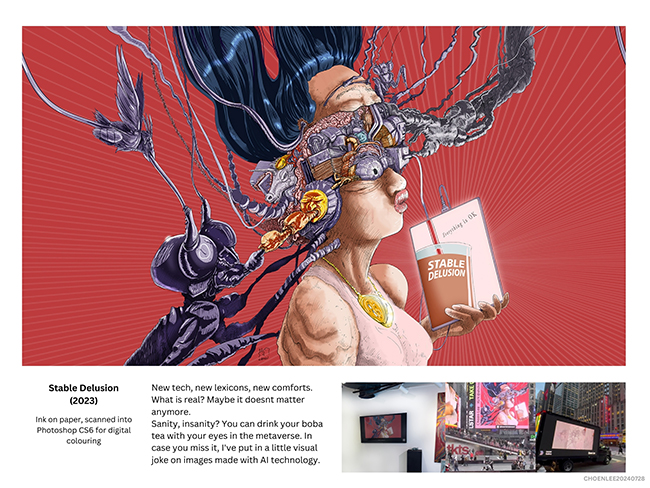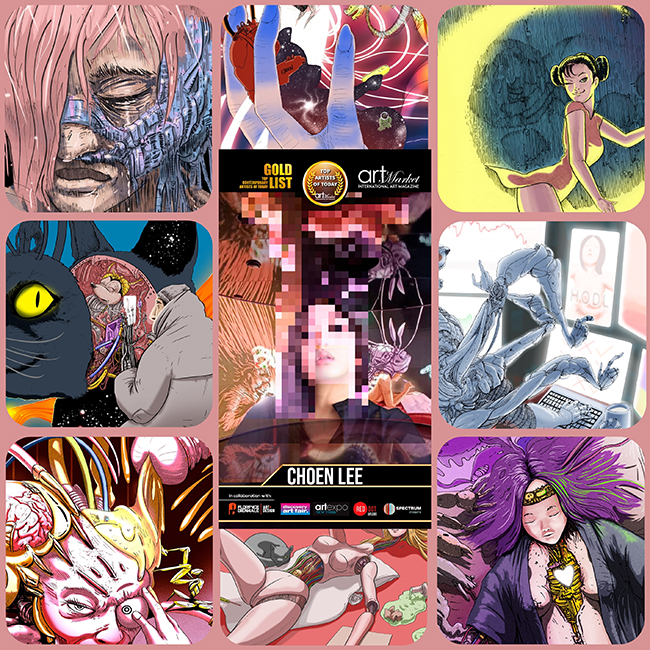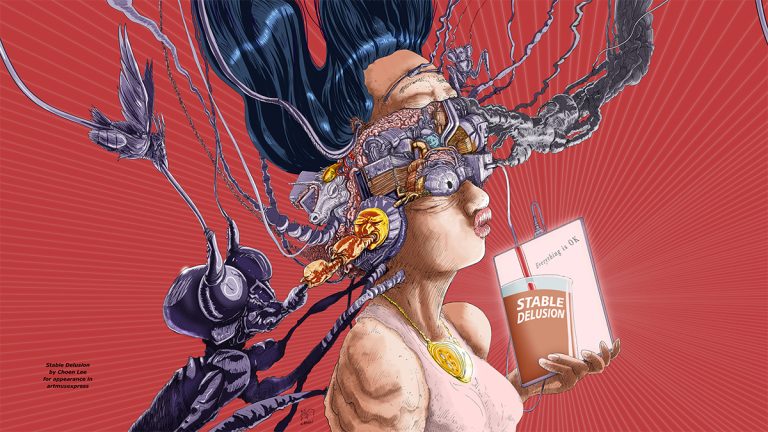Choen Lee approaches art with a mix of humor, curiosity, and philosophical reflection. He often jokes that his name sounds like Chun Li from Street Fighter, a playful reference that hints at the wit woven into his work. His creations shift between lighthearted storytelling and deeper explorations of existence, inviting viewers to engage on multiple levels.
His path in the creative world has been anything but straightforward. With experience across different fields, each step has shaped the way he expresses himself today. Now focused on drawing, Choen uses his pen to dissect identity, perception, and the fluid nature of reality. His style, influenced by manga and comic art, feels both nostalgic and new, challenging the boundaries between what’s real and imagined. Through his work, the everyday takes on new meaning, and the unexpected starts to feel strangely familiar.
Stable Delusion (2023)

Choen Lee’s Stable Delusion is a commentary on identity, perception, and the ever-shifting nature of reality. It’s part of a series that digs into how people recalibrate themselves in a world that constantly rewrites its own rules. New technologies roll in, bringing new ways of interacting, new language, and new expectations. At some point, reality stops being a fixed thing—it’s fluid, constantly rewritten, and identity follows suit.
The piece itself is executed in ink on paper, with digital finishing to push the ideas even further. Choen’s signature comic-inspired linework is crisp and controlled, but the composition deliberately unravels. Figures drift between states of clarity and distortion, reflecting the way our understanding of ourselves and the world around us is always in flux. He plays with the balance between traditional and digital, grounding the piece in something tactile while also embracing the intangible aspects of our increasingly virtual lives.
There’s a specific humor in Stable Delusion—not in an obvious, laugh-out-loud way, but in the absurdity of how we interact with technology. One of the standout details is a character sipping boba tea, but their eyes are lost in the metaverse. The image is both ridiculous and eerily relatable. We live in an age where our virtual and physical selves blur, where AI-generated images flood our screens, and where the question of what’s “real” feels increasingly irrelevant.
Choen isn’t just observing these shifts—he’s poking at them. His drawings often contain hidden jokes, and in this piece, he sneaks in a subtle visual gag about AI-generated imagery. It’s a nod to the fact that even in a hand-drawn world, digital tools—and the questions they raise—are impossible to ignore.
What makes Stable Delusion effective is its ability to hold multiple ideas at once. It’s critical but not cynical. It acknowledges change without resisting it. It understands that while identity might be slipping into something more fluid, that doesn’t necessarily have to be a bad thing. Maybe it’s just different. Maybe we don’t need reality to be stable anymore.

Choen Lee’s work sits at the crossroads of the real and the imagined, the serious and the playful. Stable Delusion is a reminder that perception is a slippery thing—but sometimes, it’s okay to just enjoy the ride.

